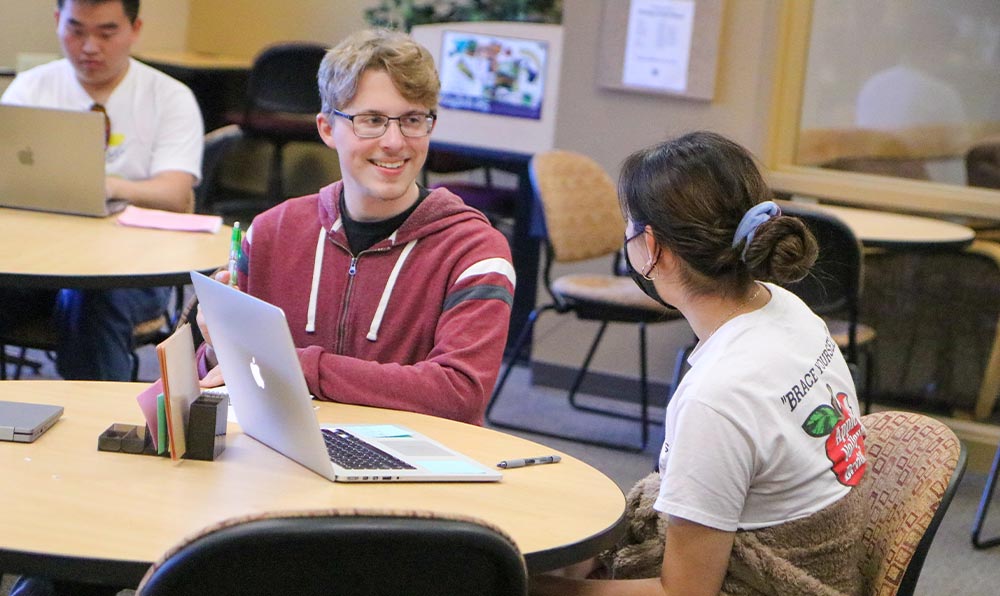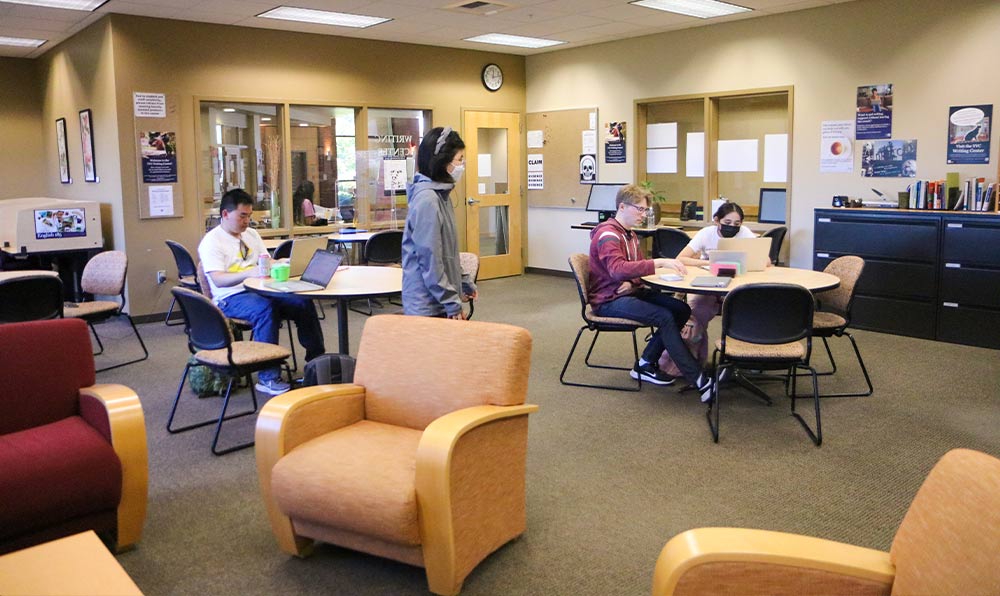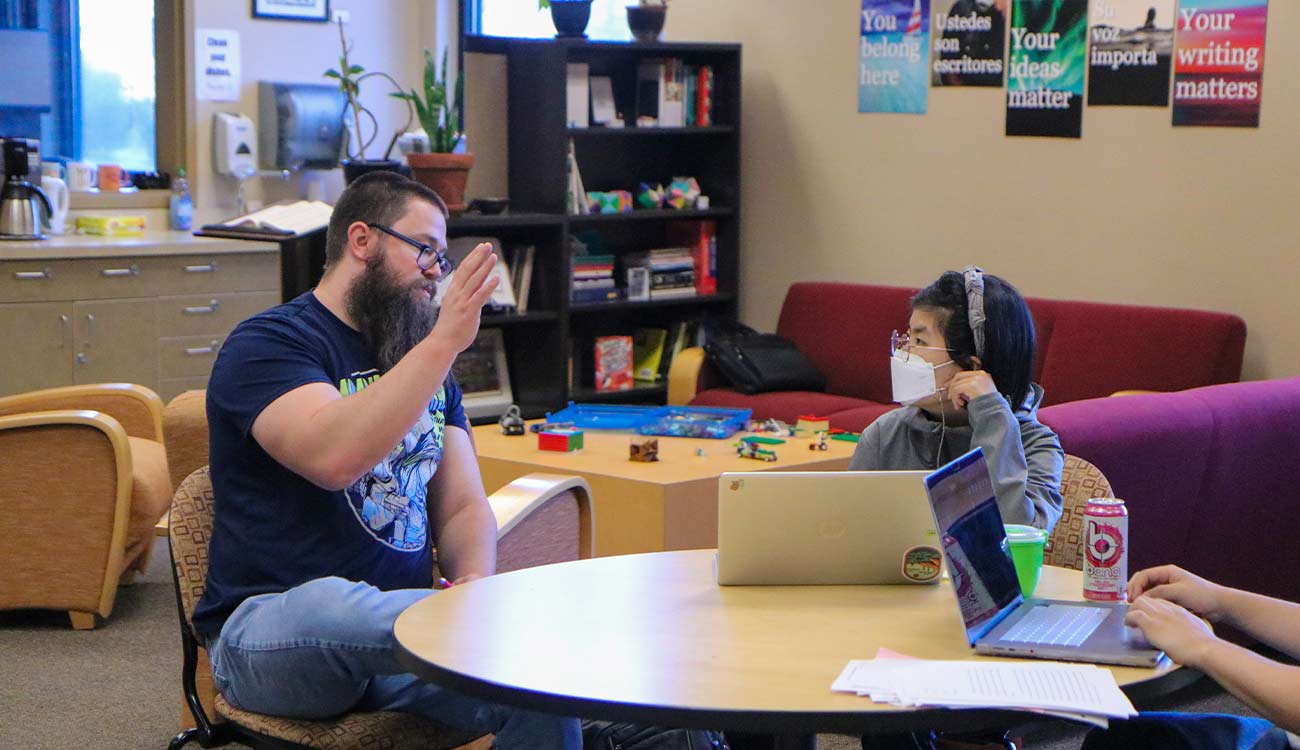Changes create more inclusive, inviting Writing Center space
When Yakima Valley College first designed its Yakima Campus Writing Center to take up occupancy in Glenn Anthon Hall at the building’s opening in 2007, it incorporated the latest best practices for aiding students. Café tables for consultations with tutors, a computer area where students could work on assignments, a casual “living room” space and more.
However, between the college’s recent work to ensure more equitable learning outcomes for students and the pandemic, Writing Center Director Dodie Forrest said it became clear that the time had come for change.
“We just couldn’t return to our space and do the status quo,” said Forrest, the center’s long-time director. “I felt we were compelled to change and so I wanted to work with our team on both the Yakima and Grandview campuses to reimagine our space anew.”
The changes to the Writing Center on both campuses encompass three major areas: a reconfiguration of the physical space, adoption of new technology and changes to the centers’ pedagogy.

The physical changes to the Yakima Writing Center are apparent even from the outside. A welcome desk that previously was stationed immediately inside the front door has been moved to the back of the room. While the intention of the welcome desk was to greet students and check them in for appointments with tutors, Forrest said it could also serve as a barrier to students entering and seeking help.
“We want students to feel they can come in to collaborate with us, without any barriers,” Forrest said. “With the previous welcome desk, it conveyed a sense that you really needed an appointment to come in and get help.”
Scott Stahl, a student in YVC’s substance use disorders program, started coming to the Writing Center for assistance during the Winter 2022 quarter and appreciates the more open layout.
“The room looked a little daunting with that big desk at the front and something you feel a little sheepish asking for help,” Stahl said.
Furnishings inside the center also were rearranged to create a conference space for group work, a living room space for more informal conversation, and a space where students can engage in focused, individual work.
Another subtle but important change in the space, Forrest said, has been to replace the artwork that had been hanging in the center with new posters that affirm the identities of various writers.
“All of our students can be successful writers and we want them to see that when they enter the Writing Center,” Forrest said. “It may seem like a small change, but when they see themselves reflected in the posters and have that message reinforced that they can be a good writer, we can give them that confidence.”
“The way they’re doing things now has been more accommodative for someone like me. I don’t think I’d still be in college if I didn’t have the help from the Writing Center.”
— Scott Stahl
With support from the college’s UDEAL grant, the writing centers on both campuses also were able to upgrade their technology to better support students both virtually and in person.
Those upgrades include the purchase of new laptops and a new smartboard to support brainstorming sessions with students as well as weekly meetings between Writing Center staff on both campuses.
The smartboard, which is mounted on wheels so it can be moved around the Writing Center, allows students and tutors to take notes on their writing projects and send those notes to email.
While the changes to the physical space and new technology are most apparent to the eye, equally important are the changes to how Writing Center staff support students.
In the past, staff would typically schedule 30-minute consultations with student writers and do their best to support students during that time. However, that appointment-based system created issues with some students not being able to schedule an appointment at a time convenient for them or students dropping by for help and being asked to make an appointment for another day. Those challenges intensified during the final weeks of the quarter when students most needed help.
To counteract those challenges, the Writing Center has implemented a studio model of supporting students, with the goal of removing barriers that could inhibit students from seeking help.
“The heart of the studio model, just like in art and dance, is we want to create a really inviting space where students can create their writing,” Forrest said. “We want to meet students where they’re at [and] when they need us the most.”

That’s important for students like Stahl, who said he often wouldn’t know in advance whether he’d need assistance during a particular week.
“The way they’re doing things now has been more accommodative for someone like me,” he said. “I don’t think I’d still be in college if I didn’t have the help from the Writing Center. They say they want to help you and they really do.”
While busy students can still ask to make appointments in advance, most students will come into the Writing Center without an appointment and use a flip card to indicate when they’d like help from a staff member.
“When a student lets us know they want assistance, then we’ll do a micro-consultation and step away and let them continue their work,” Forrest said. “Students can stay all day if they want and we can help them continue to refine their writing in an ongoing process.
“As always we want to build on students’ strengths — and we believe the more open studio-based learning will help with that.”
Victor Iveson, a member of the Yakima Writing Center staff for the past two years who previously received assistance as student, said the less structured way of providing assistance is beneficial for students.
“The studio model makes it easier for everyone to get the help they need while putting less pressure on the student to show us their entire paper, which also gives the student far more agency and control of what the tutor focuses on,” Iveson said.
“No one writes alone…. This is a fresh opportunity to reimagine ourselves and build relationships with students that are really positive.”
— Dodie Forrest
Iveson also said that since opening this fall, more students are coming into the Writing Center to study, unwind or have quiet conversations with fellow students.
“I’ve also witnessed regular [visitors] become friends and begin helping each other through the studio model,” he said. “This was not something that I witnessed during the times we used a previous structure for our consultations.
“Overall, I believe the changes we have made to the Writing Center are productive and have created a free-feeling space with far less pressure on the students to interact with us during times they may not need our assistance.”
Forrest also noted that while the writing centers are welcoming more students back for face-to-face assistance this year, it remains essential to continue serving those students who need remote help.
Over the coming year Forrest said the center will gather student feedback on the changes that have been implemented and also take a look at data to gauge the impact of those changes on student learning.
“No one writes alone,” Forrest said. “We’ve long had an intense bond with our student writing consultants and our regular student visitors. We have such a great camaraderie and I’m looking forward to that spreading more broadly among our students as this is a fresh opportunity to reimagine ourselves and build relationships with students that are really positive.”
